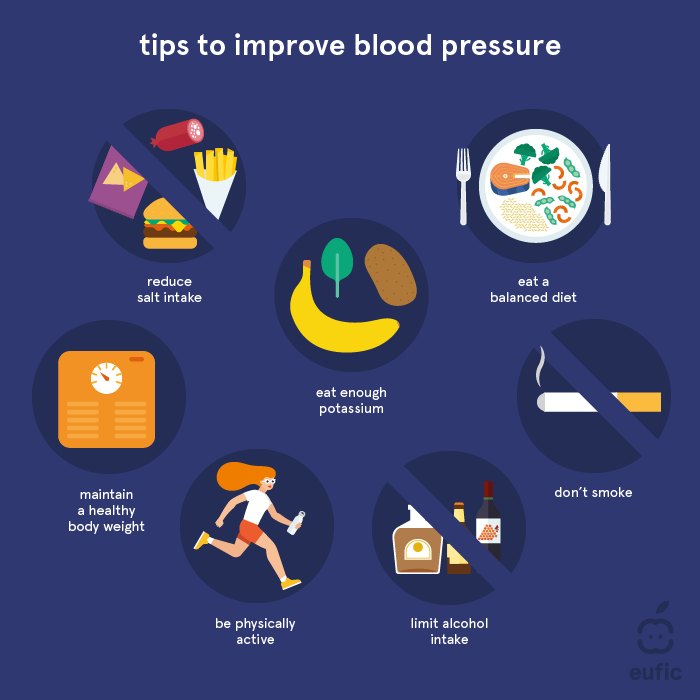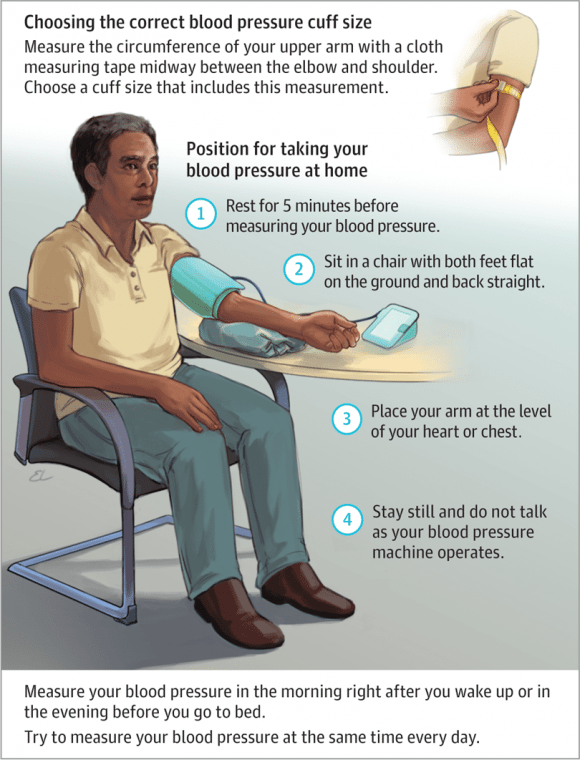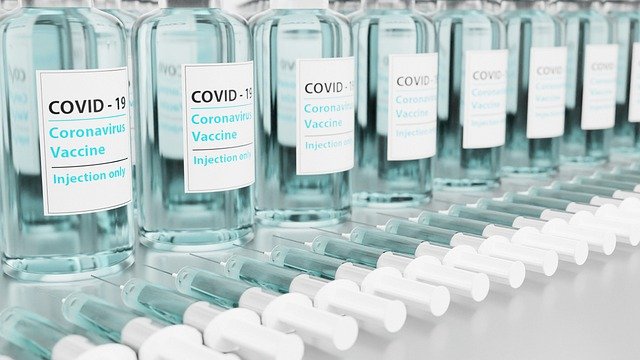
High blood pressure is also known as hypertension. It is abnormally high blood pressure in the arteries, which are the blood vessels that carries blood from the heart to the whole body.
In about 95 percent of cases, the cause of hypertension is unknown and affects many individuals who do not know they have the condition. These cases are classified as essential hypertension. However, high blood pressure is the main risk factor for heart disease, stroke, kidney failure, and eye problems. When blood pressure level is increased, the heart and arteries have to work harder than normal to pump blood through the body. Thus, overload may lead to thickens the muscles of the heart and arteries or damages artery walls.
As a result, damage to the heart caused by the extra work and a lack of oxygen causes heart disease. When blood pressure is high, the artery and blood vessel walls may be damaged over time. This leads to dangerous complications and life-threatening.
Besides, many factors such as genes, kidney disease, some medications, and lifestyle can affect blood pressure. Lifestyle factors play a key role in balancing our blood pressure.
However, there are some known key factors that increase your risk:
Age is one of the factors that contribute to high blood pressure. Our arteries are stiffening with age. Sixty percent of people above 60 years of age likely to have high blood pressure.
Physical activity elevated the cardiac output and therefore the blood pressure. The recommended, resting after exercises is about 20 to 30 minutes for the following exercise to reduce it.
Stress will stimulate the sympathetic nervous system which increases the cardiac output and vasoconstriction of the arterioles, thus, increasing the blood pressure reading.
Usually, after puberty, females have a lower blood pressure than males of the same age.
These differences are thought to be caused by hormonal variation. Women in general after menopause have a high blood pressure than in the past.
Hypertension may be predisposed to childhood and adult obesity. Also, obesity increases the risk of developing high blood pressure by 6% over the next four years. The greatest risk is extra body fat.
Hypertension tends to occur in families. You are at higher risk of having high blood pressure if you have a close relative. In some families, genetics are strong for both parents who have high blood pressure. However, the inheritance pattern is unknown.
Researchers have concluded that there is a strong link between binge drinking alcohol and high blood pressure. Regular heavy or binge drinking can also cause significant increases in blood pressure, sometimes extreme enough to cause a stroke. However, alcohol may also have an impact on the efficacy of blood pressure-lowering drugs.
Whether you smoke or people close to you do, the effects can be damage to the heart. Your heart will not work properly as before. Moreover, smoking causes your blood vessels to shrink which making your heart work even harder.
Salt, or sodium chloride, has been used to flavor and preserve foods for thousands of years and is also found in a wide variety of foods.
When sodium increases in our blood, the blood vessels will retain water and try to balance the sodium concentration. As a result, this extra water increases the volume of blood in vessels that cause high blood pressure.
Taking too much salt can cause high blood pressure. The maximum recommended intake of salt is less than 6 grams per day.

Figure 1. Tips to improve blood pressure.
Consume a balanced diet
Maintain a healthy body weight
Be physically active
Limit alcohol intake
Don’t smoke
A blood pressure reading is 120/80. The top number “120” is called the systolic, and bottom number “80” is called the diastolic. The ranges are:

Figure 2. Steps to measuring blood pressure
In summary, hypertension is one of the main risk factors for the development of heart disease and stroke. Our blood pressure is influenced by several factors. So, we need to stop smoking, stay active, eat balance diet and limit the intakes of salt and alcohol to reduce the risk of high blood pressure. Not just all that, medication also important to treat who are diagnosed with this disease.
At mayflax, we provide pharmaceutical products to a clinic and hospital. We also serve hypertension medications. Thus, by dealing with us, you will be able to enjoy a large selection of pharmaceutical products at affordable prices.
If you want to know more about us, you can contact us or sign up here.
Blood pressure, high blood pressure, hypertension, essential, arteries, blood vessels, blood, heart, body, stroke, kidney, failure, eye problems, blood pressure, level, heart, heart disease, stroke, overload, artery walls, oxygen, life-threatening, genes, medications, lifestyle, risk, age, stress, exercise, sex, inheritance, alcohol, smoking, salt, diet, tips, steps, crisis, potassium, sodium, range, normal, elevated, Stage 1, Stage 2.
ABOUT THE AUTHOR
SHARE ON

Raihan Ridzuan
Raihan Ridzuan, Bachelor of Science (Hons) Pharmacology, is Customer Relationship Executive of Mayflax, one of the nation’s leading healthcare and marketing company.
SHARE ON


The pandemic has caused a mental strain on many people around the world. And for those living with anxiety and depression, the impact is severe.
The COVID-19 pandemic has had a major effect on our lives. Many aspects of everyday life, including mental health, have been affected. The COVID-19 pandemic is impacting our physical, economic, and mental well-being. As a result, many people face struggles that can be frustrating, daunting, and cause adults and children to have strong emotions.
However, social distancing and stay-at-home orders are very challenging, especially for people living with mental illness, COVID-19 exacerbates feelings of depression and anxiety.
Thus, during the Movement Control Order (MCO), with the limited movement, closed borders, and roadblocks, some individuals easily get heightened temperament and irritability at home.
Dr. Robert Leahy an attending psychologist at New York-Presbyterian said: “This is the perfect storm for depression and anxiety,”.
All data and statistics are based on the short article “Prevalence of Anxiety, Stress, Depression among Malaysian Adults during COVID-19 Pandemic Movement Control Order”.
Therefore, the prevalence in a score of Stress 70% (Mean=2.02), Anxiety 67% (Mean=1.71) and Depression 42.3% (Mean=2.28). There is a significant prevalence of psychological health problems among adults during adverse events due to the COVID-19 Pandemic Movement Control Order.
In the midst of the global COVID-19 pandemic, it’s easy to felt hopeless and despair. But these tips can help to improve your mood and ease your mental health problem.
Schedule your day with useful things. At the end of the day, check everything and make a list of things to do for the next day, so you can look forward to things.
Furthermore, create a set of goals for the week and month. This is the right time to set short-term and long-term goals.
Prioritizing sleep is not always easy when you are in a state of mental health. Stress, Anxiety, and Depression can affect the quality of your sleep.
Therefore, poor sleep can also lead to depression. Fixed your daytime habits and sleep routine can help improve how well you sleep at night and reduce the symptoms of depression.
Finding relaxing activities such as reading, writing a journal, or listening to slow music can cause your brain to slow down before bed.
Just because we are isolated does not mean we have to completely isolate ourselves. Make a list of friends to contact whenever you feel bored and lonely. Always stay connected with others !
Set a regular time each day to contact others, and schedule virtual get-togethers on online platforms to talk or share your problem and maybe even play games. Stay in touch with friends, family, and especially the mental health care team if you are diagnosed with anxiety and depression.
Encourage yourself to do things that will boost your mood throughout the day. Try to listen to uplifting music and dancing around if you can as long as can make you happy all day long.
Alternatively, you can watch funny videos or favorite sitcoms on TV, Instagram, Facebook, or YouTube. Spending time in nature such as walking in the park, or playing with your kids or a pet also can relieve stress.
In times of stress, people always find “comfort foods” such as unhealthy fats, sugar, and refined carbs to release their stress and depression. Therefore, drinks too much caffeine and alcohol also can adversely affect our mood.
Moreover, wholesome foods, fresh food such as salmon, codfish can increase your intake of mood-enhancing nutrients.
Nowadays, the government always announces information that constantly changes regarding SOP. It is important to stay up-to-date but not to overconsuming sensationalistic news or unreliable social media coverage. This makes your mind full of negative thought and fear.
Limit how often you check the news or social media and limit yourself to reputable sources. Thus, healthcare professionals also recommend not checking the news at least one hour before bedtime.
Importantly, physical activity is good for mental health. Scientific research has shown that exercise, especially in particular aerobic exercise, can be beneficial for depression and anxiety.
Exercise will release good hormones and lowers your stress hormones. Since covid-19, you cannot go to the gym or fitness studios, try online broadcasts, YouTube workouts, or use the equipment at home to exercise.
Besides that, you can go running or cycling as long as you stay a safe distance away from others who are passing by.
If you are undergoing therapy, taking medication, or both before coronavirus started, make sure to keep up with your treatment regimen. Almost all psychiatrists or mental health professionals are now used online practices like video calls.
Alternatively, you can try an online therapy platform like WhatsApp video, Zoom, Webex, and others.
During challenging times, be grateful and mindful can help to cope with anxiety and depression.
“When we take note of the good things in our lives, it bumps up the feel-good hormones of serotonin and dopamine,” said Serani.
As we know, practicing mindfulness meditation is very popular for overcoming depression, anxiety, and stress adds Guttentag.
Also, you can start the practice by taking a few minutes to sit or lying down and try to focus on your breathing. Besides, train your mind to get rid of negative thoughts and feelings to stay away from you.
If you are struggling to cope, there are many ways to get help. Contact a healthcare provider if the sign of anxiety, and depression get in the way of your daily activities for many days and also if you are in crisis, immediately get help such as:-
Depression and anxiety are soaring and there are many fears that we will face an epidemic of mental health.
COVID-19, make life very difficult for everyone, but they may pose an even bigger challenge for people with depression. Depression is a serious mental health condition that can give a huge impact on people’s lives.
However, depression can be treated. Even in this pandemic, it is important to continue to seek treatment and stick with it until you get cured.
Therefore, there are self tests that you can answer to check whether you have anxiety or depression, if the score tells you are having these mental health issues you need to see the doctors who specialize in psychiatry to diagnosed your disease. We cannot simply just do the test only. These self tests ask some important questions that can help you to know where you are at so you can make a sooner plan for feeling better.
Depression, anxiety, stress, global, pandemic, COVID-19, common, tips, mental, mental health, mental illness, severe, impact, effect, lives, emotions, social distancing, MCO, prevelence, improve, mood, problem, schedule, sleep, well, set, goals, short-term, long-term, relax, symptoms, connect, isolate, time, virtual, online, platform, diagnose, joy, encourage, nature, “comfort food”, unhealthy, nutrients, diet, mood, boost, enhance, social, media, SOP, social media, news, healthcare professional, exercise, hormones, grateful, mindful, cope, serotonin, dopamine, thought, feeling, counselling, hotlines, services, healthcare provider, crisis, challenge, self tests, score, psychiatry, disease, plan.
ABOUT THE AUTHOR
SHARE ON

Raihan Ridzuan
Raihan Ridzuan, Bachelor of Science (Hons) Pharmacology, is Customer Relationship Executive of Mayflax, one of the nation’s leading healthcare and marketing company.
SHARE ON


Mon to Fri: 8:00am to 5:00pm
Sat: 8:30am to 12:30pm
